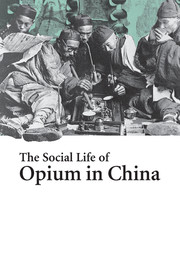Book contents
- Frontmatter
- Contents
- List of illustrations
- List of maps
- List of tables
- Acknowledgements
- Introduction
- 1 ‘The art of alchemists, sex and court ladies’
- 2 As the empire changed hands
- 3 ‘The age of calicoes and tea and opium’
- 4 ‘A hobby among the high and the low in officialdom’
- 5 Taste-making and trendsetting
- 6 The political redefinition of opium consumption
- 7 Outward and downward ‘liquidation’
- 8 ‘The volume of smoke and powder’
- 9 ‘The unofficial history of the poppy’
- 10 Opiate of the people
- 11 The road to St Louis
- 12 ‘Shanghai vice’
- Conclusion
- Notes
- Glossary
- Bibliography
- Index
4 - ‘A hobby among the high and the low in officialdom’
Published online by Cambridge University Press: 05 June 2012
- Frontmatter
- Contents
- List of illustrations
- List of maps
- List of tables
- Acknowledgements
- Introduction
- 1 ‘The art of alchemists, sex and court ladies’
- 2 As the empire changed hands
- 3 ‘The age of calicoes and tea and opium’
- 4 ‘A hobby among the high and the low in officialdom’
- 5 Taste-making and trendsetting
- 6 The political redefinition of opium consumption
- 7 Outward and downward ‘liquidation’
- 8 ‘The volume of smoke and powder’
- 9 ‘The unofficial history of the poppy’
- 10 Opiate of the people
- 11 The road to St Louis
- 12 ‘Shanghai vice’
- Conclusion
- Notes
- Glossary
- Bibliography
- Index
Summary
This chapter studies the downward penetration of opium from the literati-official establishment and its geographical spread inland in the first two decades of the nineteenth century. Jaiqing's reign (1796–1819) was dwarfed by Qianlong's legacy; it was also overshadowed by the disintegration that followed. These years mattered greatly in the chain of events surrounding opium. Qianlong rebuffed the Macartney mission in 1793. But by the end of Jiaqing's reign in 1819 Britain had become the undisputed industrial and maritime power. I will trace the spread of opium during this period from two perspectives, class and geography. Opium smoking would work its way from the top down, from princes to eunuchs; it would also spread from the coast to the interior. In the eighteenth century the Chinese consumption of foreign goods, opium included, and its maritime trade were both in equilibrium, but by the nineteenth century a flood of free trade would break this harmony. The English East India Company, its ‘cleverer than alchemists’ servants and individual Englishmen would change the nineteenth-century global experience. Opium would enrich Britain and help them to build a most expansive empire; it would deplete China and hasten the downfall of the Qing dynasty. Opium smoking began to blossom in China at the same time as waves of free trade from Britain pounded the shore of Chinese consumerism. It fostered new generations of smokers.
- Type
- Chapter
- Information
- The Social Life of Opium in China , pp. 56 - 70Publisher: Cambridge University PressPrint publication year: 2005

